A lot has been said and written about God’s awesome creation. And in today’s post I wish to express my gratitude to God for creating Nature in all it’s beauty and the different seasons that bring with them the choicest of its bounty. We know of a lot of fruits and vegetables (and even fish) that are seasonal. The most popular fruit that comes to everyone’s mind is the Mango that tops the list of seasonal fruits. Summer of course is the best time of the year when fruits can be enjoyed as they bring that refreshment into our parched bodies. However, there are also some vegetables that are available only during Winter and so on (since there isn’t much of a Spring or Fall in India, I won’t talk about them).
Since we are well into the Monsoons, people who are familiar with this particular herb may have already prepared it once or twice. I am talking about this quintessential monsoon herb called Thaikulo in Konkani, Thojank in Tulu, Takrike in Kannada, Takara in Malayalam, Chakvad in Hindi & Cassia Tora in English which is a wild herb that grows in open areas especially after a few showers of rain. I am not sure if many have heard about it today, but the earlier generations used to religiously have it at least once a year prepared in the form of a stir fry dish (thoran/sukka bhaaji). The Jackfruit seeds that were saved up during the Summer were sliced and used in this preparation and it gave that yummy nutty taste to the entire dish. I am told that Thaikulo was not as popular in the city as it was in the outskirts of Mangalore which is one reason why although I had heard its name I had never tasted it (at least I don’t remember having eaten it while in Mangalore – but then I used to engage myself in everything except kitchen matters!)
Cassia Tora Linn which is the botanical name of Thaikulo which is often passed off as ‘baji’ or ‘spinach/leafy greens’ is actually a herb by nature and is a wonder herb at that. As per Ayurveda it pacifies vitiated tridosha, skin diseases, dandruff, constipation, cough, hepatitis, fever and hemorrhoids. It is popularly called as Sickle Senna or Ringworm Plant as it is known to treat skin diseases like ringworm and itching or body scratch & psoriasis. I am sure that Mangaloreans who have spent a considerable chunk of their childhood in Mangalore or its outskirts have definitely seen the plant if they have not known that it was Thaikulo. It looks a lot like Methi leaves except that its leaves are a wee bit larger than Methi. However, it does not have the bitter taste that is the trademark of Methi.
Since I have learnt a lot about Mangalores authentic cuisine after I got married and my dear husband being the one who also encouraged me to start this blog, he was more than thrilled when his office staff member picked up two bunches of Thaikulo from Matunga market last week. Since I had also saved up on some Jackfruit seeds I decided to use them to prepare this dish, of course after receiving some step by step details from him about how to clean the leaves and prepare it. I also chanced upon some ambades (hog plums) last week after so many years of hunting for them and tossed in one of them for its tangy taste and the resultant dish was simply delicious!! We thoroughly enjoyed our simple evening meal accompanied by lengthy discussions on the subject of seasonal foods.
Pic above: Jackfruit Seeds with skin (L) and without skin (R)
If you manage to get the Thaikulo/Chakvad (and I hope you do if you have never tried it before), make sure you pluck only the leaves. Unlike regular Spinach, neither the leaves nor the stalk is tender. Go ahead and cook this in a cooker if you like as the leaves need to be well cooked and you needn’t worry about the leaves turning into a mushy pulp because they won’t (but don’t go beyond one whistle in the pressure cooker). Skip the Jackfruit seeds and go with the potatoes instead. You can go all creative and team this up with Chana (chickpeas). I have used the famous Mangalorean vegetable masala powder which is available in most Mangalore Store outlets in Mumbai and Don Stores/Konkan Traders in Mangalore, but if you don’t have it, go ahead and use whatever masala powder you like. It doesn’t alter the taste of the herb which is a winner anyway. Let not the lack of ingredients discourage you from trying this.
Good to know: In Mangalore, the stalks of this herb are collected, dried and used as firewood to heat the traditional baan (large copper cauldron used to heat water for bathing)! So you see, in the olden days, people made the most of what was freely (actually!) available in their gardens or that which grew in the wild. They neither spent time & effort trying to cultivate it as a crop nor did they have to buy it from those who cultivated it. God just made sure it was available in plenty and absolutely free of cost for all to eat, enjoy and stay healthy for the coming year! Thank you Lord!
Thaikulo Ani Bikna
Recipe Source: My husband
Serves 2-3
You Need:
- 2 bunches of Thaikulo/Thojank/Takrike/Chakvad/Cassia Tora
- 1/4 tsp mustard/rai
- 1 medium onion sliced fine
- 3-4 curry leaves/kadipatta
- 1-1/2 tsp vegetable masala powder (or use a blend of red chilli, cumin, turmeric & coriander powders)
- 1 sliced ambado/hog plum or 1/2 tsp tamarind paste
- 3-4 bikna/jackfruit seeds sliced
- 1 medium potato cubed (optional)
- salt to taste
- 1 tbsp oil
Method:
1. Pluck the leaves from the bunches, wash well and allow to drain completely.
2. In a cooker, heat some oil and add the mustard, when it splutters add the kadipatta and the sliced onion and fry the onion very well (till it is almost golden brown – but do not burn it).
3. Add the vegetable masala powder and fry well. Add a little water to avoid the masala from burning. Toss in the hog plum or tamarind juice/paste, jackfruit seeds, thaikulo leaves, potatoes and salt to taste. Sprinkle a little water.
4. Cover the lid place the weight (whistle) and cook on pressure till the whistle goes off. Turn off and allow to stand for 4-5 minutes. Open, mix well and cook on slow flame for 2 minutes
5. Serve hot with rice or chapathis
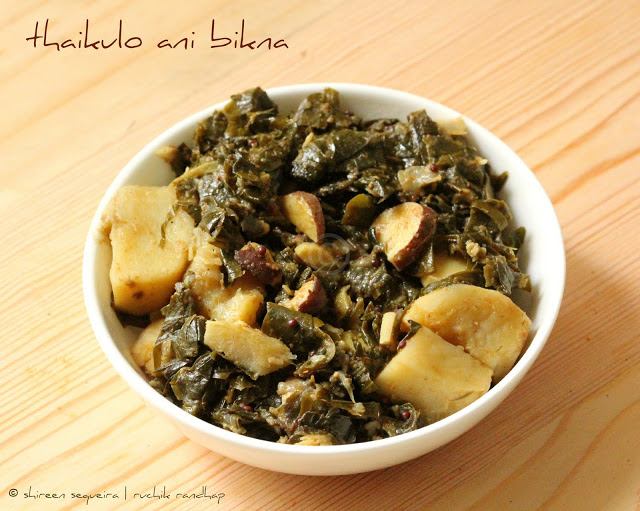
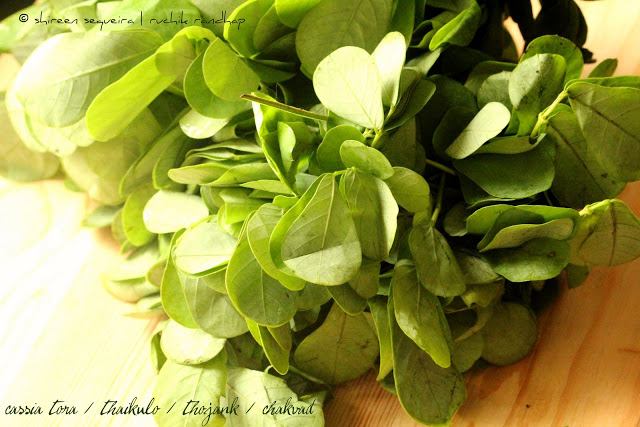
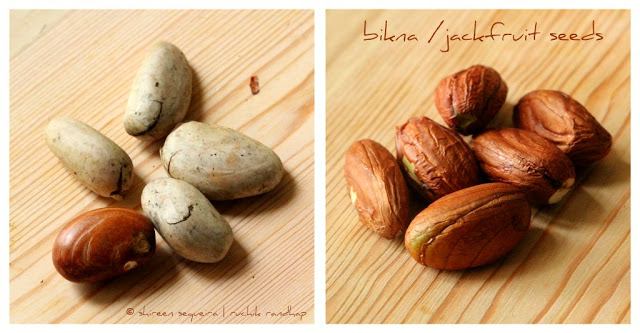
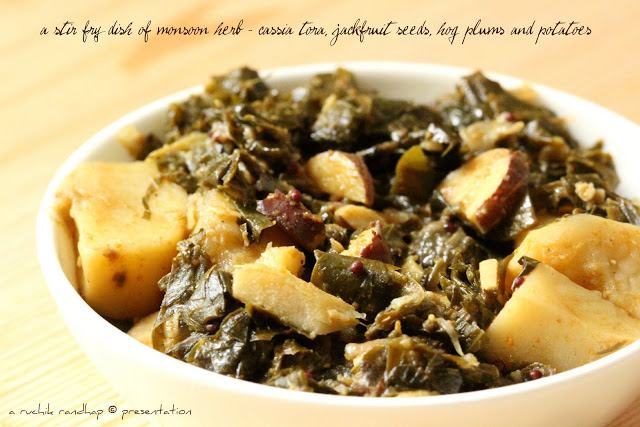
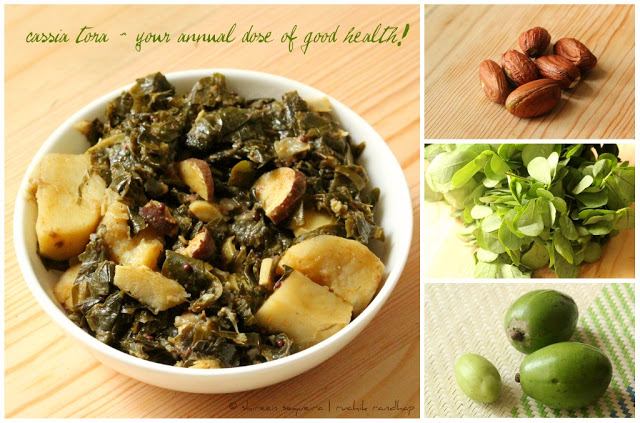
Looks wonderful & yummy!!!
Prathima Rao
Prats Corner
One forgotten herb over the years ! Now that I am seeing it closely again, this looks a lot like watercress.
Shireen, Did you miss writing a note as mentioned in the ingredients here ?
Have you forgotten to add when to add the main ingredient, Thaikulo??
@ Agnes: I have added it now, thanks for pointing it out 🙂 I definitely missed it before!